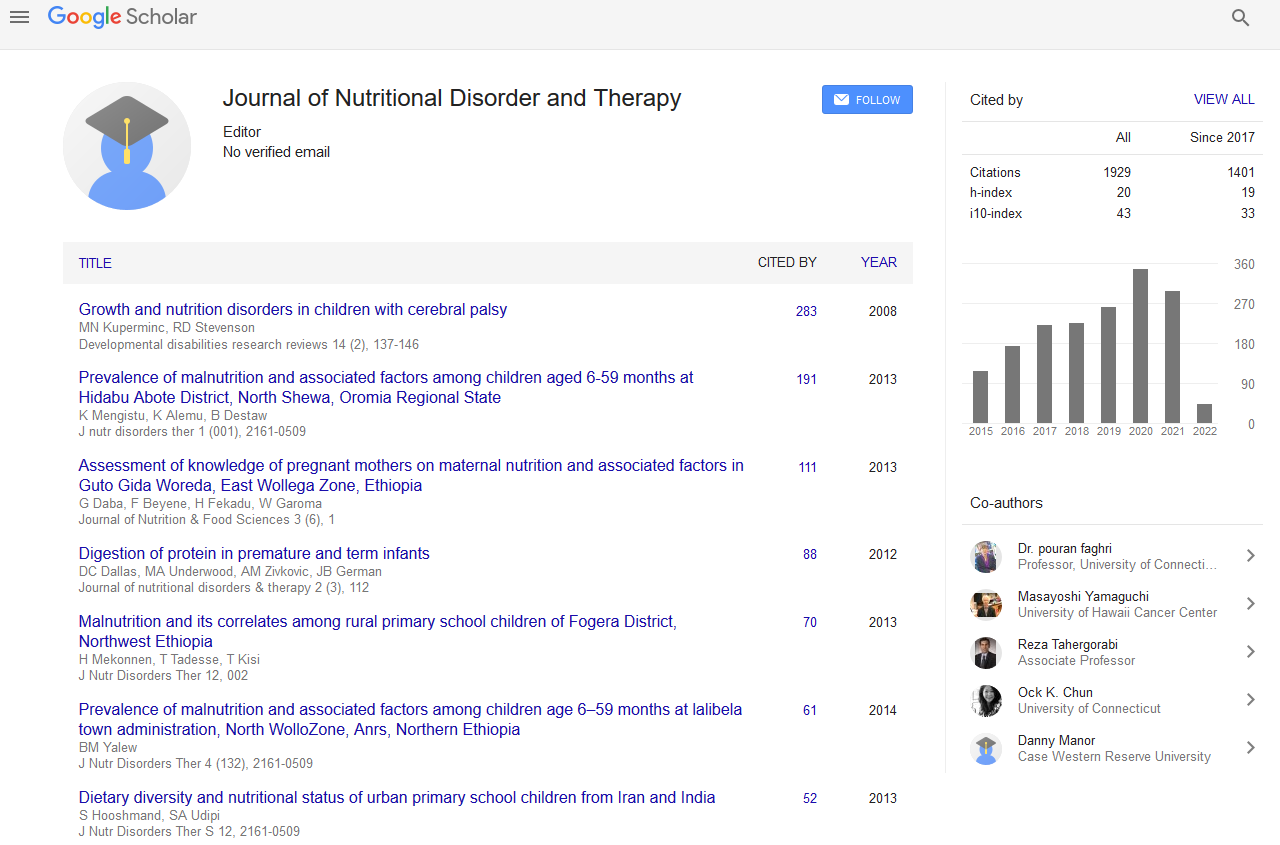Indexed In
- Open J Gate
- Genamics JournalSeek
- Academic Keys
- JournalTOCs
- Ulrich's Periodicals Directory
- RefSeek
- Hamdard University
- EBSCO A-Z
- OCLC- WorldCat
- Publons
- Geneva Foundation for Medical Education and Research
- Euro Pub
Useful Links
Share This Page
Journal Flyer

Open Access Journals
- Agri and Aquaculture
- Biochemistry
- Bioinformatics & Systems Biology
- Business & Management
- Chemistry
- Clinical Sciences
- Engineering
- Food & Nutrition
- General Science
- Genetics & Molecular Biology
- Immunology & Microbiology
- Medical Sciences
- Neuroscience & Psychology
- Nursing & Health Care
- Pharmaceutical Sciences
The cuccia: A traditional soup prepared with an innovative method
JOINT EVENT: 13th International Congress on Advances in Natural Medicines Nutraceuticals & Neurocognition & 14th International Conference on Clinical Nutrition
July 27-29, 2017 Rome, Italy
Rosaria Bognanni, Antonella Pagliaro, Giulia Gallo Director and Maria Grazia Melilli
CNR �?? ISAFOM, Italy
University of Foggia, Italy
Stazione Consorziale Sperimentale di Granicoltura per la Sicilia, Italy
Posters & Accepted Abstracts: J Nutr Disorders Ther
Abstract:
Statement of the Problem: The cereal-based foods are a good source of energy, protein, B vitamins, and minerals. The whole grain, used for the preparation of cuccìa, a typical Sicilian soup, is considered rich in vit. E and B complex but they are destroyed by cooking. A method was rated to prepare the cuccìa, to preserve the vitamin content and give to the soup the adjective �??functional�?�. Methodology & Theoretical Orientation: For the preparation of cuccìa, 4 varieties of durum wheat (Simeto, Arcangelo, Timilia and Russello) were used comparing the traditional cooking method (TR - boiling for 5/6 hours), and an innovative one (IN - grains scarification, germination, and cooking at 50°C for 2 hours). On soups obtained the content of biotin, niacin and α-amylase activity were determined. Findings: ANOVA between the raw material, the cuccìa TR and cuccìa IN, showed that the cooking method influences biotin and niacin content having, in the average of 4 accessions, values from 0.56 ng ml-1 and 1.72 ng ml-1 (raw grain) and values close to 0 (soups TR), while only a 10% decrease (soups IN) respectively for both vitamins. On the contrary, the dell�??α-amylase activity was reduced with IN method. The highest vitamin content was found in soups IN made with ancient grains (Timilia and Russello). Conclusion & Significance: The IN method placing the cuccìa as a traditional functional food, especially if you are using ancient grains, produces soups with a high content of vitamin B complex.
Biography :
Rosaria Bognanni is a Food Technologist with a PhD in Science and Technology (formerly Food Biotechnology) with title of dissertation: "Durum wheat: compositional, nutritional and technologic aspects for innovative food production”. Since 2004, she has been working as Researcher at the Stazione Consorziale Sperimentale di Granicoltura per la Sicilia, a Governmental Institute of Agronomic Research, mainly working with modern and ancient grains. Currently, she is working at the CNR–ISAFOM to research an innovative method to produce fortified bread made with antioxidant and lowering-cholesterol activities, using typical plants of the Mediterranean basin, known for its beneficial effects on human health.


